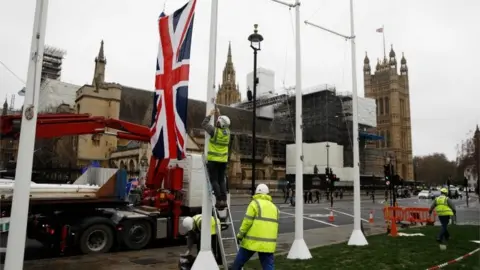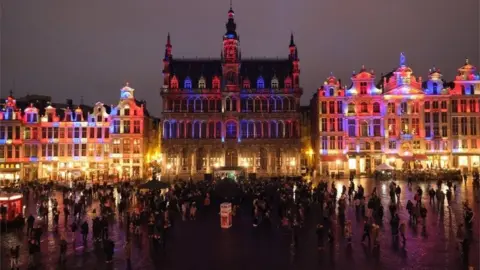Brexit: UK is leaving the EU but remains in the departure lounge

 AFP
AFPWhat will change? Well, everything and nothing. Today, the UK is embarking on a totally different course.
We are unplugging from the legal and political infrastructure that we have been part of for four decades. Do not underestimate how big a step it is.
The general election result confirmed the decision that the UK made in 2016 narrowly, to leave the European Union.
That creates opportunity and extra freedoms. Laws decided in our Parliament will be supreme.
One of the fundamental concepts of the EU - citizens being able to travel, to work and live anywhere in the bloc without restrictions - won't apply any more, meaning that the UK will set the terms for people who want to come from all over the world to live here.
We will no longer be part of a club that might squabble amongst itself about big decisions, but is legally committed to sticking together, more at liberty to go our own way.
Our departure makes for added risk too. We are taking a huge step without clarity about exactly what is next.
Without doubt, leaving creates disruption for much of the economy, and the consensus among number crunchers is that the country's wealth will grow more slowly than if we were staying in.
Of course, the government wants to prove that it will be worth it in time, that there will be more winners than losers. That won't be straightforward, and politicians will argue about it for decades.
Nor is it easy to see precisely how the UK's place in the world will evolve. We won't have a seat at the EU table any more, but are still one of the world's biggest economies, with a big diplomatic presence, a seat at the table.
One voice is easier to ignore than 27. But if that voice is credible, nimble and persuasive, it could have a no doubt different, but significant force.
'Departure lounge'
At one minute past 11 on Friday though, in practical ways we can easily feel, not very much will be different.
Red, white and blue lights will dance over Whitehall. The Tories' Brexit countdown clock will finally reach zero.
One of those who campaigned most fervently to leave the EU told me he was planning to stay up through the night to watch the dawn - "It will only happen once," they said.
But while we will be technically out of the European Union in pragmatic ways, we'll be in the departure lounge, rather than en route to a clearly different future.
Until the end of the year UK businesses, and the government, will have to abide by the EU's rules, and will we continue paying handsomely into the budget.
The immediate difference in that regard, is that we won't be part of making the decisions. A white-knuckle ride of negotiations and deal making over trade, security, and countless other issues lies ahead.
But after the drama and the hyperspeed of events in the last few years, our political landscape has already changed dramatically. The fundamental question of whether we stay, or leave, has been settled.
Westminster's agonies over that dilemma were a big part of securing a thumping Conservative majority. And as a result, gone are the days, for now, when it wasn't clear if the government was going to get its way in the House of Commons.
That is not the same as winning arguments. But winning votes is what being in power is all about. And for the foreseeable future we have a government that will be able to do that without worrying too much.
The status quo will persist in some senses during the transition period, but the big question has been settled, the decision to change won't be unpicked, even though what it will bring precisely can't yet be clear.
And that's already changed Westminster so much. The Tory Party needs something new to argue about.
The 40 year internal war that spilled out into a vote that will change all of our lives is over, for now. The political dynamic has already changed, and will change perhaps faster than we imagine.
Michael Gove told us this week that "I can't blame Europe," as a politician, there would be no more 'hiding from the voters.' For the Tories in particular, there will be no convenient bogeyman.
'On the edge of a moment'
Will this mean that UK politicians change? I wonder if they, and we, have really begun yet to understand the extent of the change that might unfold.
When I started working in and around Westminster nearly 20 years ago, the question of Europe was important, but one for political hobbyists.
There were those who cared, cared very much, but it was low on the list for many MPs, let alone members of the public.
In the early 2000s, anyone predicting that our membership of the EU would have been the defining issue of politics for four years might have been dismissed as a crackpot.
Even in 2015, a senior member of the then government told me without any remote hesitation, the chances of us voting to leave the EU were no higher than one in five.
 Getty Images
Getty ImagesAnd yet here we are, on the edge of a moment that will without question, affect all of our lives, and the generations that will come next.
The roots, risks and opportunities of Brexit, we've discussed on these pages many times are of course still hotly disputed. And of course, we won't have a parallel universe to compare.
In the coming years, I have no doubt, there will be plenty of 'what if', lots of 'if onlys'. It's perfectly likely that in decades and decades, historians will still argue over whether, as a country, we did the right thing.
But Brexit, with all its possibilities, and potential pitfalls, is now here. And if anything, perhaps this is a moment to remember that for good, or for ill, the crosses we make in the box, the decisions we make in the privacy of the polling booth, can and do change the course of our country.
